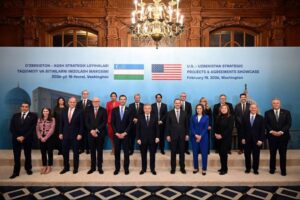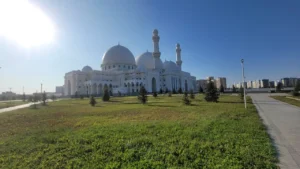Honoring the Symbol of Sovereignty – Celebrating the State Flag of the Republic of Uzbekistan

Thirty-three years ago, on November 18, 1991, the Republic of Uzbekistan adopted the Law “On the State Flag of the Republic of Uzbekistan,” forever establishing a powerful symbol of national sovereignty and pride. This flag, proudly waving in domestic and international arenas, embodies the essence of the nation, its people, and its aspirations.
The flag’s sight stirs profound patriotism, hope, and trust in the hearts of all Uzbeks, a bond deeply felt by citizens living both within the country and abroad. Its colors and icons associated with the idea of peace, rebirth and defiance to calamity. But those are away from home it becomes something like home and the support from the beloved country. The amendment expanded the occasions on which it is legal to use it and raised its status in the public domain and promoted unity and pride.
In 2023 year a significant addend this Law also received an amendment to the Law “On the State Flag of the Republic of Uzbekistan,” in relation to the updated vector of the country’s development and its growing place in the world, founded on the achievements that has been reached in the fields of culture, sports and science. The amendment broadened the contexts in which the flag may be used, elevating its role in public life and fostering unity and pride.
Today, the State Flag is prominently displayed at sports competitions, cultural events, and mass gatherings. It symbolizes Uzbekistan’s strength and honor at official international functions, ceremonial events, family celebrations, and solemn tributes to public figures and military personnel. Uzbek people now enjoy greater opportunities to express their pride through the display of the flag in public spaces, workplaces, and residences. This includes the flag representations on clothing to be worn and worn, insignias for military and the state services, and sportswear to be worn by athletes who represent their countries on the international sport arena. This extension takes the flag into people’s everyday lives and solidifies the value of patriotism and unites people under the colors of this national emblem.
More importantly, the Law states that dishonorable treatment of the State Flag is unlawful. It has to be regarded as exceptionally valuable, which makes it necessary to preserve it as the symbol of honor and morality of the nation.
The improvement to the law shows heart and passion of the government in encouraging respect, patriotism and unity in the nation. Thus, Uzbekistan increases popular and youth awareness of the flag, thus preserving the symbol of the country’s sovereignty and people’s hope for the future.
Before concluding my article, I wrote a poem on Uzbek Flag and it was published in my poetry book named “Samarkand and Fallen Flowers”.
The poetry book was launched in October 2023 at Samarkand during the UNWTO. The poem title is “A Symbol of Blue Sky” from the page no. 60 and 61 and here is the poem:
A symbol of blue sky Where people minds are high Azure is a cradle of civilization Uzbek land has a golden civilization Azure has been ever for Turks Azure has been ever for Turks Stars presents the spirituality They also represent divinity A symbol of pursuit of perfection Land has a strong spiritual connection Twelve stars stands for Allah Turks only believe in Allah Red lines are power of life Water is a symbol of life Green is a symbol of nature Uzbek lives as a good neighbor White is a symbol of peace And Gur-e-Amir is a masterpiece Stars also represents happiness Azure had architectural classiness Crescent connects Uzbek historical image It also has an Islamic linkage Azure is a cradle of civilization Uzbek land has a golden civilization By: Muhammad Ali Pasha Samarkand and Fallen Flowers
Thus, the Uzbek Flag will always be the powerful symbol for Uzbekistan in the world, its goals, and values. It is not an icon, it is the core of a proud, consolidated, and independent nation.


